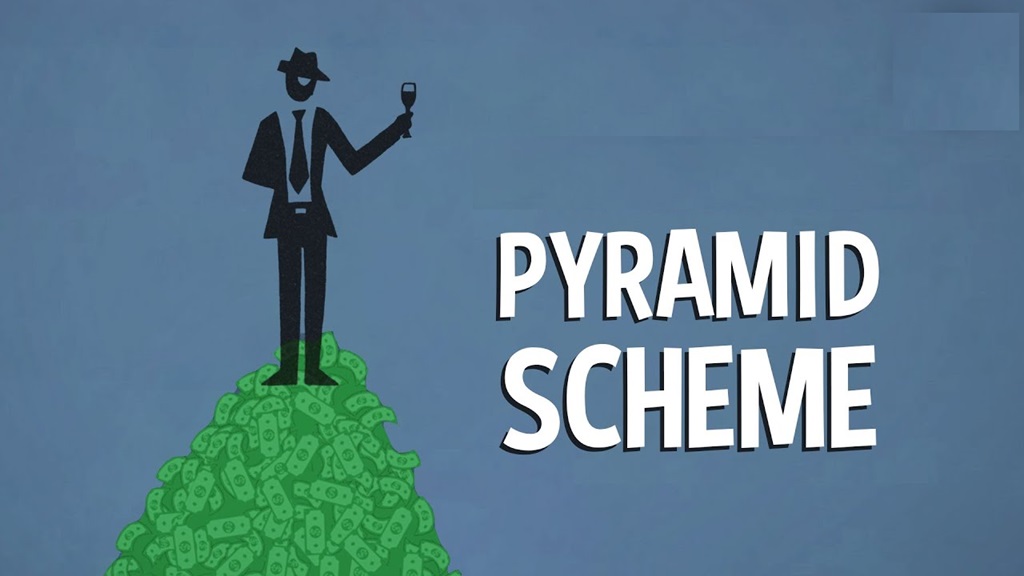Pyramid schemes, which have been in existence for decades, make enticing promises to people, claiming that they can make quick and easy money. However, in reality, they end up leaving most participants with empty pockets. This raises an important question: What exactly are pyramid schemes, and why are they illegal?
Pyramid schemes involve recruiting people to join a network and earn money by recruiting others to join the same network. Participants are often required to pay a fee to join, and they are promised a percentage of the fees paid by those they recruit.
The problem with pyramid schemes is that they are unsustainable – they rely on a constant stream of new recruits to fund the payouts to earlier participants. Eventually, the scheme runs out of new recruits, and most participants end up losing their money. This is why pyramid schemes are illegal – they are considered fraudulent and deceptive, and they harm people financially.
What is a Pyramid Scheme?
A pyramid scheme is a fraudulent business model that recruits members via a promise of payments or services for enrolling others into the scheme. As recruiting multiplies, forming a geometric progression, the pyramid scheme eventually collapses when no more recruits can be found.
Pyramid schemes typically:
- Promise high returns with little risk
- Require a start-up fee
- Base profits on recruiting others, not the sale of any real product or service
- Encourage members to recruit new members who also pay a fee
- Pay members for enrolling new members rather than selling actual products
While pyramid schemes may seem to be legitimate multi-level marketing programs, the key difference is that there is no real product being sold. Money is just changing hands between people recruiting new members. To ensure you’re not unknowingly entering such a scheme, it’s crucial to thoroughly research any potential opportunity. For instance, you might want to discover is blue raven solar a pyramid scheme, as such investigations can shed light on the legitimacy of a business model. Always be cautious and look for clear evidence of genuine product or service offerings to avoid falling into financial pitfalls.
Why Are Pyramid Schemes Illegal?
Pyramid schemes are illegal in most countries due to the high risk for financial losses among the majority of participants. There are several key reasons pyramid schemes are banned:
1. Pyramid Schemes Are Unsustainable
Every pyramid scheme will eventually collapse because there are a limited number of people that can be recruited. When the market saturates and no more recruits can be found, there is no more money to pay those at the top. Since a pyramid scheme involves constantly finding new people to pay into the system, it is mathematically impossible for it to continue forever.
2. Most Participants Lose Money
Due to the unsustainable model, nearly all people who join a pyramid scheme late end up losing their investment. Those at the top of the pyramid make money by taking it from those further down the chain. As the scheme grows, the number of potential new recruits decreases, making it harder for newer members to recoup their initial investment.
Studies show 90-95% of participants in a pyramid scheme lose money, with those at the bottom of the pyramid losing the most.
3. Pyramid Schemes Focus on Recruiting, Not Selling
Legitimate businesses earn profits by selling products and services that provide value. Pyramid schemes do not focus on product sales to customers. Their only way to generate money is by recruiting new paying members. Without emphasis on real sales, the business has no sustainable revenue stream.
4. Pyramid Structure Is Inefficient and Exploitative
The pyramid structure itself is inherently flawed and exploitative. Requiring members to continually recruit more people is an inefficient way to distribute products or services. It places emphasis on the recruiting abilities of participants rather than the quality of products. And those at the bottom do all the hard work for little reward or chance of success.
5. Pyramid Schemes Are Misrepresented as Legal Operations
Pyramid scheme promoters go to great lengths to make the business seem legitimate, downplaying the need to recruit and exaggerating potential earnings. This is used to lure unsuspecting people into paying to join the scheme, thinking it’s a valid way to make money.
U.S. Pyramid Scheme Laws
In the United States, pyramid schemes are illegal at both the federal and state level:
- At the federal level, the FTC enforces Section 5(a) of the Federal Trade Commission Act which prohibits unfair and deceptive business practices.
- Most states also have laws that explicitly ban pyramid schemes and multilevel marketing programs that qualify as pyramid schemes.
- Some state laws also impose civil and criminal penalties for promoting or participating in a pyramid scheme.
FTC Pyramid Scheme Warning Signs
The U.S. Federal Trade Commission looks for several warning signs to determine if a business is likely an illegal pyramid scheme:
- Promoting a focus on recruiting over product sales
- Paying commissions for recruiting others rather than for product sales
- Requiring people to purchase products or pay an entry fee to join
- Requiring recruitment of new members to earn commissions or remain in good standing
- Inventory loading requirements (requiring purchases of large amounts of inventory or services)
- “Pay to play” fees masked as training fees or other costs
- Emphasizing recruiting over proper product training
Businesses displaying these traits are highly likely to be illegal pyramid schemes shut down by regulators.
Recruiting-Driven vs Product-Driven MLMs
Not all multilevel marketing companies (MLMs) are pyramid schemes. Legitimate MLMs sell real products or services to genuine customers outside the plan. However, some MLMs still rely heavily on recruitment over retail sales. This focus makes them prone to collapse once the recruiting pool runs out.
The FTC uses several factors to determine if an MLM qualifies as an illegal pyramid scheme:
- Recruitment-driven MLMs incentivize recruiting over product sales and consume most revenues via recruitment. They display the pyramid scheme red flags above.
- Product-driven MLMs emphasize product or service sales to true retail customers. Members primarily earn money from their own sales and customers rather than recruitment.
While the lines can blur, true product-driven MLMs are structured to be sustainable long-term without relying on endless chains of recruitment.
Notable Pyramid Scheme Examples
Many pyramid schemes have been shut down over the past few decades after regulators deemed them as illegal operations. Some notable examples include:
Herbalife
Herbalife sold health and wellness products via direct sales. Distributors earned money both from direct sales and commissions from recruitment of new distributors. In 2016, the FTC required Herbalife to restructure its compensation plan to encourage retail product sales over recruitment.
AdvoCare
AdvoCare marketed energy drinks, shakes and supplements through a network of distributors. The FTC accused AdvoCare of operating an illegal pyramid scheme focused on paying “recruiting bonuses.” In 2019, AdvoCare agreed to pay $150 million to refund consumers and change its operating model.
Vemma Nutrition Company
Vemma sold nutritional beverages through a network of affiliates. The FTC sued Vemma for operating as a pyramid scheme in 2015, resulting in a court order banning the company from future pyramid scheme practices.
LuLaRoe
LuLaRoe, known for its popular leggings, recruits “consultants” to sell products and earn bonuses for recruiting others. A 2019 class action lawsuit accused LuLaRoe of targeting vulnerable populations to join an illegal pyramid scheme. The company agreed to refund $4.75 million to settle the suit.
Amway
Amway is a major MLM that has been investigated for pyramid scheme practices multiple times since the 1970s. However, Amway has managed to avoid being formally classified as a pyramid scheme by emphasizing product sales and requiring distributors to sell 70% of inventory each month.
Impact of Pyramid Scheme Illegality
Classifying pyramid schemes as illegal has several positive effects:
- Deters fraudulent businesses – Pyramid scheme laws discourage new schemes from forming and cause some existing ones to shut down. This protects consumers from losing money.
- Raises public awareness – Widespread knowledge of pyramid scheme illegality makes the public warier of new schemes and business models focused on endless recruitment.
- Encourages sustainable business models – Product-driven MLMs and legitimate direct selling businesses can operate legally. Making pyramid schemes illegal encourages sustainable models focused on real customer sales versus recruitment.
- Allows regulators to intervene – Pyramid scheme laws empower regulators like the FTC to investigate suspicious businesses, stop scams, and recover funds for victims. Shutting schemes down early limits the damage.
How to Avoid Pyramid Schemes
With pyramid schemes able to disguise themselves as legitimate opportunities, it’s important to watch for red flags:
- Little emphasis on products – The focus is on the business opportunity or getting paid to recruit.
- Pressure to recruit – You’re encouraged to recruit new participants as your main way of making money.
- Upfront costs – You have to pay significant amounts for membership, training or inventory.
- Needs endless recruiting – The pyramid structure requires continuously finding new recruits to keep going.
- Fraudulent products – The business promotes questionable or miracle products with exaggerated claims.
- Too good to be true – You’re promised outsized returns for little work.
Avoid businesses exhibiting these traits. Seek opportunities focused on ethically marketing quality products or services rather than simply growing the network.
Conclusion
Pyramid schemes are illegal because they inevitably harm participants financially while enriching only a tiny minority at the top. Their inherent flaws lead regulators to shut them down to limit the financial losses. Why every health-conscious person needs an HSA: By focusing on long-term financial wellness over short-term gains, an HSA provides a sustainable and prudent approach to managing healthcare expenses, unlike pyramid schemes that prioritize recruitment over product sales, leading to an unsustainable structure destined to collapse. Knowing the red flags of a pyramid scheme can help you steer clear of fraudulent financial strategies falsely promoted as a quick path to prosperity.
FAQs
Are all MLMs pyramid schemes?
No. Legitimate MLMs sell real products or services to customers outside the business structure. The focus is on product sales over recruitment. However, some MLMs still rely heavily on recruitment and operate in the grey area bordering on illegal pyramid schemes.
Can you make money in a pyramid scheme?
A small number at the top do profit. However, over 90% of participants in a pyramid scheme lose money, especially those who join later when recruitment saturates. For most people, pyramid schemes lead to losses rather than income.
Why do people join pyramid schemes?
Pyramid schemes often promise wealth with little work. New participants are usually unaware it is a fraudulent model. Fake testimonials and pressure to join quickly are used to entice new recruits before they recognize the red flags.
Are pyramid schemes illegal worldwide?
Most countries ban pyramid schemes, however, regulations vary. Some treat them as a type of financial fraud, others as an unfair and deceptive business practice. Laws are constantly adapting to stop pyramid schemes from exploiting loopholes.
What are common pyramid scheme names?
Some adopt vague names referencing networks, circles, gifting clubs, investment clubs, or matrixes. Others use technical/financial buzzwords implying sophistication. Still others reference self-improvement or personal growth. The harmless-sounding names aim to cover their dubious nature.



